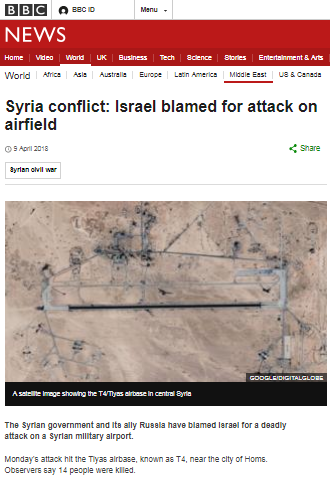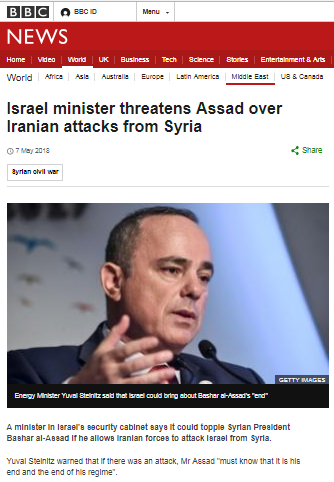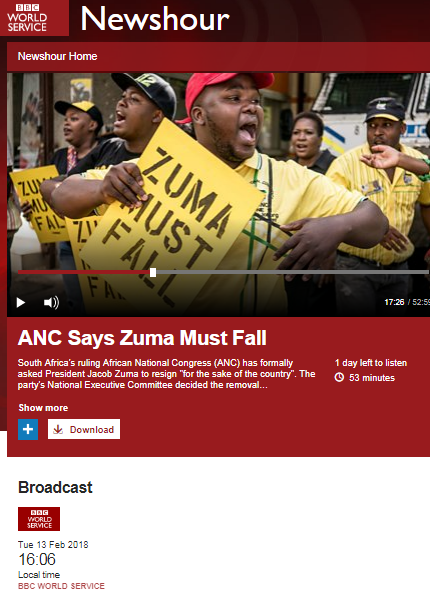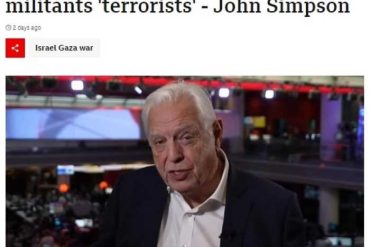With Israel braced for an anticipated attack by Iran and/or its proxies in the north, it is worth taking a look at how the BBC has to date covered the background to a story it may yet have to report.
On April 9th the BBC News website reported that “[t]he Syrian government and its ally Russia have blamed Israel for a deadly attack on a Syrian military airport”. The very relevant Iranian connection to the site of the attack was only mentioned much later on in the same report:
“The Israeli military said Iran and its Revolutionary Guards had long been active in the T4 base, and were using it to transfer weapons, including to Lebanese Shia militant group Hezbollah, an enemy of Israel.”
Listeners to BBC Radio 4 on April 15th were told that most of the people killed during that attack were “believed to be Iranians” but not that seven of them were members of the Iranian Revolutionary Guards Corps, including the head of its drone programme.
Following that April 9th incident a series of threats against Israel were issued by various Iranian officials but those threats and the resulting increased tensions did not receive any BBC coverage.
On April 30th the BBC News website reported further attacks on military installations (including what was described by other media outlets as a “depot for surface-to-surface missiles”) in Syria.
“Missile strikes on military sites in northern Syria overnight reportedly killed a number of pro-government fighters, including Iranians. […]
It is not known who was behind the attacks. But Western nations and Israel have previously hit sites in Syria.”
Additional threats from Iranian officials followed that incident.
On May 6th Israeli media outlets reported that:
“…the Israeli military and intelligence services had identified preliminary efforts by Iran in Syria to carry out its reprisal, using its IRGC (Islamic Revolutionary Guard Corps), the Hezbollah terrorist group and local Shiite militias to launch a barrage of precision-guided missiles, likely at Israeli military targets in the north.
“Israel has recently identified with certainty Iranian preparations to fire at the north,” Channel 10 said. “We are not on the eve of war with Iran… but Iran is very determined to carry out an attack” to avenge the T-4 strike and the deaths of its military personnel, it said.
Israel Radio said the Iranian planning for an attack was at “an advanced stage.””
On May 7th visitors to the BBC News website saw the first generalised mention of Iran’s threats against Israel in a report titled “Israel minister threatens Assad over Iranian attacks from Syria” –which promoted superfluous qualification of Iran’s military build-up in Syria.
“His comments came amid reports that Israeli authorities were preparing for missile strikes by Iran or its proxies.
Iran has vowed to avenge recent air strikes on its military facilities in Syria that were attributed to Israel.
Israel has neither confirmed nor denied carrying out the strikes, but it has said it will stop what it considers Iran’s military “entrenchment” in Syria.” [emphasis added]
Additional threats by Iran’s chief of staff on the same day did not receive any BBC coverage.
On May 8th the BBC News website published a report originally headlined “Israel Golan Heights alert over Iran ‘irregular activity’ in Syria”.
“The Israeli military says it has detected “irregular Iranian activity” in Syria and has ordered residents of the occupied Golan Heights to prepare their bomb shelters.”
Despite there being no connection between that event and the same evening’s US announcement concerning the JCPOA, BBC audiences were told that:
“The alert came as President Trump announced the US was pulling out of a nuclear agreement with Iran.”
The report was later retitled “Syria blames Israel for air strike near Damascus” and – despite having got it right earlier – the BBC managed to inaccurately describe the location of the “irregular Iranian activity”.

BBC audiences were told that:
“Syrian state media says Israel has launched an air strike against an army position south of the capital Damascus.
The Sana news agency said Syrian air defences had shot down two Israeli missiles in the Kiswah area on Tuesday. […]
A commander supporting President Bashar al-Assad told Reuters news agency that the strike had targeted a Syrian army position.
The Syrian Observatory for Human Rights, a UK-based monitoring group, said the target was an arms depot.
The dead included members of the Iranian Revolutionary Guard or other Shia militiamen, it added.”
Other media outlets quoted the same source cited by the BBC as specifically saying that the site (which last November was mentioned in a BBC report about Iran’s establishment of military bases in Syria and last December was also described in a BBC report as “an arms depot”) was an “arms depot belonging to Hezbollah and the Iranians” while at least one Israeli media outlet described it as a storage facility for Iranian missiles rather than “a Syrian army position” as touted by the BBC.
Although Iran has been repeatedly threatening to attack Israel for the past month, the few headlines seen by BBC audiences in relation to that story have focused on Israel: “Israel minister threatens Assad over Iranian attacks from Syria” and “Syria blames Israel for air strike near Damascus”. Obviously BBC audiences have not been provided with the full range of information necessary for proper understanding of this still ongoing story.
Related Articles:
Two months on, BBC still qualifying Iranian drone story
BBC Radio 4 manages to report on Iran without the usual distractions




